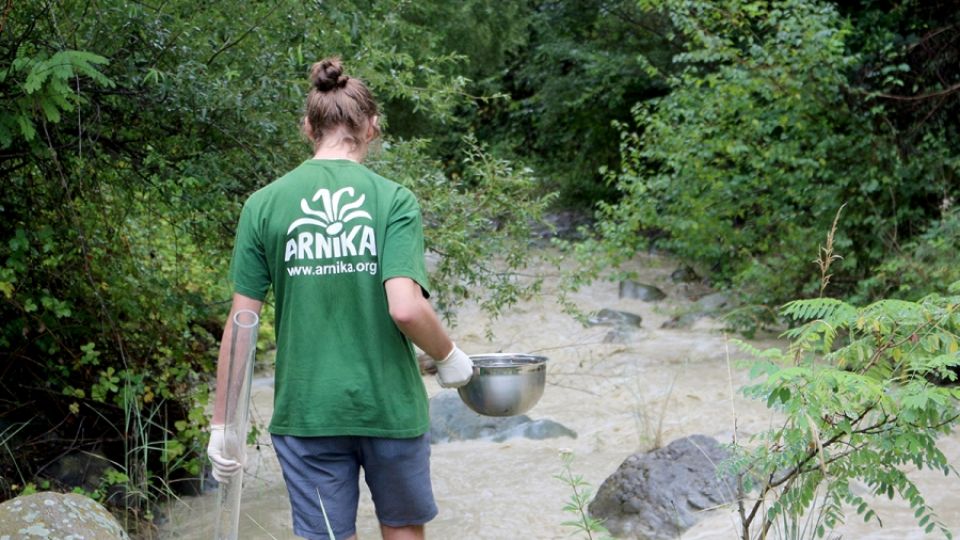A total of 136 samples were collected during recent sampling in the Lori region - an area affected by industrial pollution - including samples of house dust, soil, sediments, dairy products, and biomaterials (human urine and hair). The research was carried out from July 28th to August 2nd in 12 communities and settlements of Lori marz: Alaverdi, Haghpat, Sanahin, Akori, Shnogh, Teghut, Akhtala, Mets Ayrum, Pokr Ayrum, Shamlukh, Armanis, and Mghart, which are under the influence of mining and metallurgical enterprises of CJSC Sagamar, Teghut CJSC and Akhtala Mining and Processing Plant CJSC.
All samples were sent to the Czech Republic to the certified laboratory of the Institute of Health in Usti nad Labem. First of all, the samples will be examined for the content of elements characteristic of the mining and metallurgical industry - arsenic, cadmium, copper, zinc, and lead. “We have been working in this region for several years and each study complements the previous ones, in order to obtain as much data as possible on the spread of pollution in the most vulnerable areas, thereby raising awareness of the population about the risks to health and the environment,” said Valeriya Grechko, a representative of the Czech organization Arnika focusing on chemical safety. She expressed satisfaction with the active participation of the local population in the sampling.
Unlike previous years, this year the area of the study was expanded. Residents of the villages Armanis, Mghart, Shnogh, and Teghut participated in the selection of biomaterials for the first time. “The dust from the dumps goes in our direction, and we feel an unbearable smell, especially in strong winds,” a resident of Armanis said in an interview with EcoLur. He added that he was constantly worried about the problems with shortness of breath, but medical research did not reveal anything. Now he hopes that the research of the Czech team will help him find answers to his questions. A resident of the village of Shnogh taking part in the sampling has been trying for several years to draw attention to the health problems of people living in contaminated areas. He is under the supervision of doctors and taking strong medications. “My land plot is on the banks of the Debed River. Pets that drank the water got sick and died. The trees are drying up. I have stomach pains and problems with blood pressure. Of course, we associate all this with the mining industry,” he said. The resident is one of 70 plaintiffs who filed lawsuits against the Akhtala mining and processing plant in order to obtain compensation for damage to health and the economy. According to him, the research results are the main evidence base on their struggle for justice and restoration of rights.
“Research carried out in recent years is increasingly attracting public interest. Since there are no state mechanisms in Armenia to assess the impact of the mining industry and pollution on human health, the results of the study are the only evidence in the protection of rights both in state institutions and in the courts. In addition, the research results directly affect the state policy, work is underway to introduce mechanisms for assessing the impact of pollution on the environment and human health,” said Oleg Dulgaryan, chairman of the NGO Center for Community Mobilization and Support.
The fieldwork was also attended by the Head of the Consular Department of the Embassy of the Czech Republic in Armenia Ani Shaginyanova, the wife of the authorized representative of the Czech Republic in Armenia Eleonora Kopecka, and other representatives.
Scientific data obtained from the study of chemical pollution caused by the objects of mining and metallurgical enterprises - deposits, tailing ponds and waste rock generated during production, etc. - will be presented for discussion by interested parties. Meetings with residents and administrations, responsible government agencies, and the public are planned - during these a policy will be developed to protect the environmental rights of people and reduce the risks from environmental pollution.
The research is being carried out by Arnika, a non-governmental organization from Czechia, together with the Center for Community Mobilization and Support (CCMS) NGO and the EcoLur informational NGO, within the framework of the Transition Promotion Program of the Ministry of Foreign Affairs of the Czech Republic.








